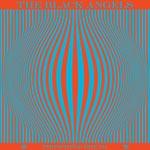
The Black Angels Phosphene Dream
(Blue Horizon)
In 2008, I reviewed The Black Angels’ Directions To See A Ghost and wrote the following:
“Unable to avoid any Velvet comparisons, The Black Angels at least bring the whole psych thing to a different level: Timothy Leary in loner mode, nighttime wanderer, tuned into his own acid-soaked brain matter, reacting to expansive and empty stimuli. Spiritual, but from somewhat of a paranormal sense. Though, content-wise, there’s nothing paranormal about them.”
Phosphene Dream is the newest album by the neo-psychedelic quintet, free of the night air and obscuring sounds that fueled its predecessor. Inasmuch as they continue to build upon The Velvet Underground’s Warhol-ian art rock daze and the psychedelic blues of hometown heroes The 13th Floor Elevators, The Black Angels attempt clarity with Phosphene Dream, revelatory guitar playing that owes more of itself to the garage gems associated with The Kinks, The Monks, The Troggs and even The Doors. The thick pulse of bass resonance that opens Bad Vibrations is flanked by guitar noise and high-timbre notes, but the elements unite with resolve to follow each other. I don’t want to say that they sound “refined,” but they at least follow a strong bass line with rhythmic support from the band’s six-strings as opposed to just churning out fields of purple haze or chemically induced ambience. They refuse to completely abandon this sort of aural envelopment, though, and vocalist Alex Maas still has haunting presence within each track.
But, because the band’s fuzz is reduced, Phosphene Dream winds up embracing more of the 60’s musical spectrum. The appropriation of blues music for instance by rock’s demigods, bands like The Yardbirds, Zeppelin, The Stones and Creem, leads The Black Angels to Haunting at 1300 McKinley, bluesy rock moves and grooves that muddy the Technicolor waters with a dream pop lick. The bass levels are kicked up for Yellow Elevator #2, guitar sneering underneath the crawling keyboard. Sunday Afternoon has teenage pop excitability to it, dance groove and melody that resurfaces with the Kinks-ish Telephone.
Meditative and loud ponderings still manifest in the form of River Of Blood and Entrance Song, the former some progressive and up tempo variation on The Doors’ The End. Entrance Song tumbles into the title track, which is fairly focused and tangent-free, relying on consistent motion.
Song lengths are held to less than five minutes, making spacey psych tracks and tendencies toward shoegaze trimmed to efficiency. A prayer song like True Believers would typically award the band an opportunity to wallow and jam free form under the influence of sitar and ethereal amplitude, (I immediately think of Directions’ sixteen-minute Snake In The Grass), but they keep the momentum intact and finish every track with predetermined or rehearsed exactitude.
There is a tone of western influence in The Sniper, which begins like Nuggets-tumbleweeds and transitions into country-fried riffs and harmonica-like howls. Momentarily parting ways with their psych-love, The Sniper finds The Black Angels reveling in sounds based in southern/western regions, satisfied to play some rock music while leaving the past alone for almost four minutes.
29 September, 2010 - 20:52 — Sean Caldwell